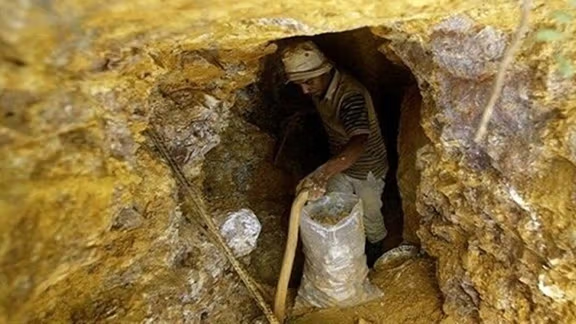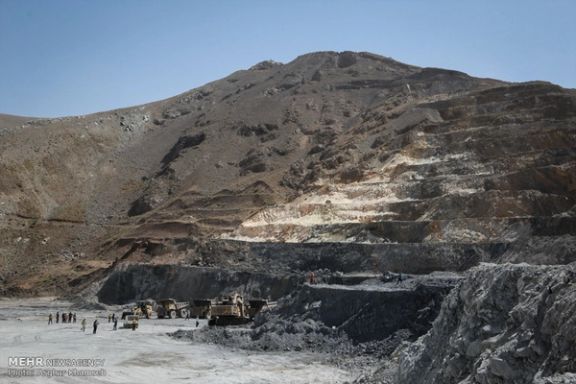Locals Are Losers In Iran's Gold Fortune

China, Russia and the Revolutionary Guards are exploiting gold mines in Iran while locals bear the brunt of their environmental hazards and discriminatory policies.

China, Russia and the Revolutionary Guards are exploiting gold mines in Iran while locals bear the brunt of their environmental hazards and discriminatory policies.
Earlier this week, the IRGC surrounded poverty-stricken Agh-Darreh village in Takab in West Azarbaijan province after clashes broke out between security forces and residents who were protesting a lack of job opportunities in a nearby gold mine. Over 50 Kurdish citizens were arrested and more than 10 people sustained injuries.
Takab is the nearest town to two of Iran’s largest gold mines, namely Agh-Darreh and Zarshouran, which account for 40 percent of the total gold production of Iran. Yet, the town – which also has about 58 other mines -- is among the poorest in Iran, along with numerous other towns located near such huge sources of wealth.
According to Iran International's Mojtaba Pourmohsen, during the past decade, the contracting company in charge of Agh-Darreh mine has laid off hundreds of seasonal workers, leading to tensions between the employees and security forces. In one case a lawsuit was filed against the mine workers and 17 of them were publicly flogged.

Agh-Darreh mine is owned by Pouya Zarkan mining company, one of the biggest mining cartels of Iran, founded by regime insiders Ali Kolahdouz Esfahani and Majid Ahmadi-Niri who have made millions off the gold while locals continue to live below the poverty line.
Kolahdouz, who was a deputy at Iran’s Ministry of Industries and Mines under former president Akbar Hashemi Rafsanjani, first transferred the mine’s exploitation rights to a Canadian shell company about 10 years ago. The mine was then transferred several times and finally ended up at Pouya Zarkan company. Although the shares of Pouya Zarkan Company were divided among several other companies, the new shareholders are companies belonging to the families of Ahmadi-Niri and Kolahdouz.
The current owners of the mine, which produces about one ton of gold annually, are members of the two families who currently reside in Canada, including Ali Kolahdouz himself, who lives in a mansion there. Majid Ahmadi-Niri, who was an IRGC member, died two years ago in Vancouver, leaving a huge inheritance that is the center of a legal dispute at the Supreme Court of British Columbia between Ahmadi-Niri's wife, Mojgan Shakeri-Saleh, and their two sons, Mohammad Amin and Mahdiar. Mahdiar has been featured in Dutch automobile news website Autoblog.nl for his large collection of luxury cars.
According to an investigation by the parliament, the Pouya Zarkan Company has offered hundreds of thousands of dollars in bribes to authorities in Takab and West Azarbaijan province to ignore the necessary environmental safeguards in the mines. The tailings dam of Zarshouran mine, located 35 kilometers from Takab, has resulted in cyanide leakage, posing a serious threat to the lives of the region's wildlife.
The grim situation is not limited to Takab as most of the Iranian cities near the country’s greatest mines are suffering from high unemployment rates and lack of infrastructure in addition to industrial pollution. Those in charge of the mines barely employ the locals, and the waste from these mines is so poorly managed that it has led to serious health risks for the people and their livestock.
In addition to regime insiders and IRGC members, China and Russia are also making the best use of Iran’s gold mines at the expense of the locals. The regime has reportedly handed over gold mines in seven provinces as part of the 25-year cooperation agreement with Beijing and a 20-year deal with Moscow.
Mazraeh-Shadi mine in Varzaqan, in East Azarbaijan province, estimated to have two million tons of gold ore, was handed over to a Chinese company. This company even brings its own miners from China and has only employed 20 local workers from Varzaqan. Andaryan gold mine, also near Varzaqan, with 30 million tons of gold ore, was also handed over to a Russian company.
Losing sovereignty over its rich natural resources to foreign powers, will no doubt cost the Iranian public greatly. Handing over the country's mines breaks even the regime's own constitution but once again, the authorities bend the rules around the priorities they deem greater than the needs of its own people.
Germany-based journalist Mehdi Mahdavi-Azad told Iran International, “Such audacity is not even seen in colonial contracts”.